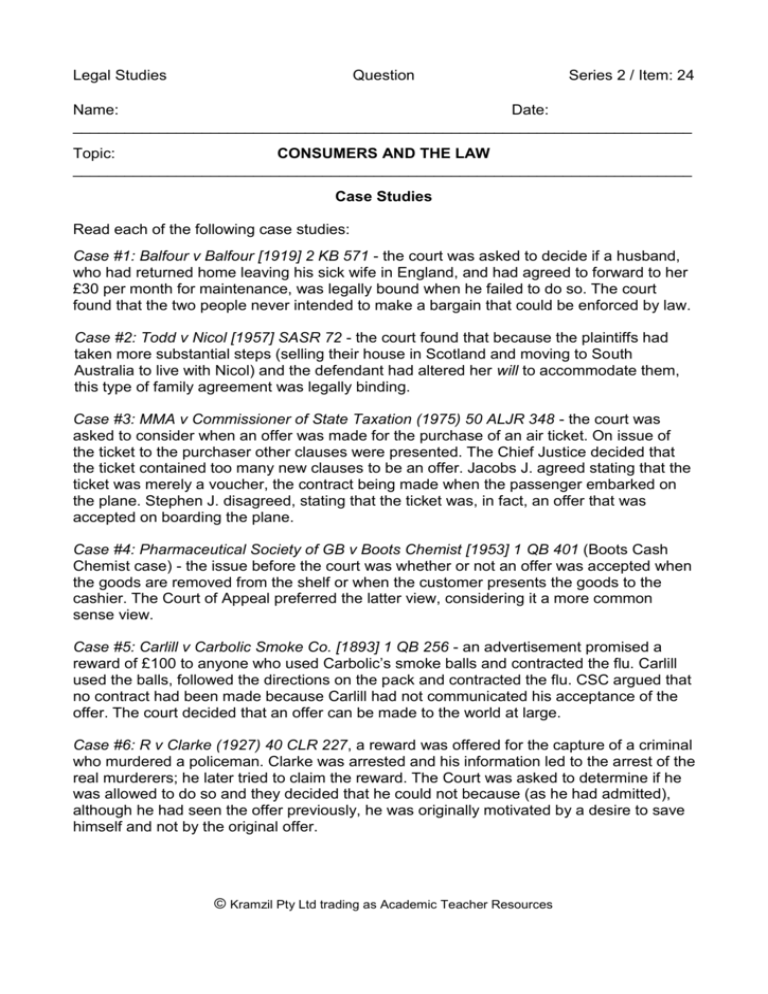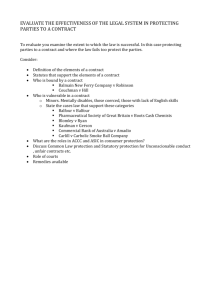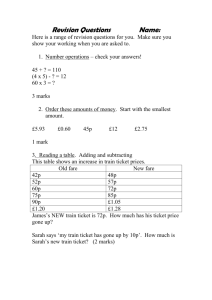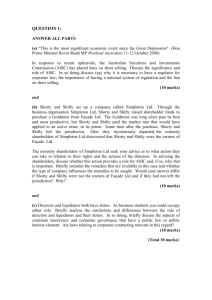Question
advertisement

Legal Studies Question Series 2 / Item: 24 Name: Date: ________________________________________________________________________ Topic: CONSUMERS AND THE LAW ________________________________________________________________________ Case Studies Read each of the following case studies: Case #1: Balfour v Balfour [1919] 2 KB 571 - the court was asked to decide if a husband, who had returned home leaving his sick wife in England, and had agreed to forward to her £30 per month for maintenance, was legally bound when he failed to do so. The court found that the two people never intended to make a bargain that could be enforced by law. Case #2: Todd v Nicol [1957] SASR 72 - the court found that because the plaintiffs had taken more substantial steps (selling their house in Scotland and moving to South Australia to live with Nicol) and the defendant had altered her will to accommodate them, this type of family agreement was legally binding. Case #3: MMA v Commissioner of State Taxation (1975) 50 ALJR 348 - the court was asked to consider when an offer was made for the purchase of an air ticket. On issue of the ticket to the purchaser other clauses were presented. The Chief Justice decided that the ticket contained too many new clauses to be an offer. Jacobs J. agreed stating that the ticket was merely a voucher, the contract being made when the passenger embarked on the plane. Stephen J. disagreed, stating that the ticket was, in fact, an offer that was accepted on boarding the plane. Case #4: Pharmaceutical Society of GB v Boots Chemist [1953] 1 QB 401 (Boots Cash Chemist case) - the issue before the court was whether or not an offer was accepted when the goods are removed from the shelf or when the customer presents the goods to the cashier. The Court of Appeal preferred the latter view, considering it a more common sense view. Case #5: Carlill v Carbolic Smoke Co. [1893] 1 QB 256 - an advertisement promised a reward of £100 to anyone who used Carbolic’s smoke balls and contracted the flu. Carlill used the balls, followed the directions on the pack and contracted the flu. CSC argued that no contract had been made because Carlill had not communicated his acceptance of the offer. The court decided that an offer can be made to the world at large. Case #6: R v Clarke (1927) 40 CLR 227, a reward was offered for the capture of a criminal who murdered a policeman. Clarke was arrested and his information led to the arrest of the real murderers; he later tried to claim the reward. The Court was asked to determine if he was allowed to do so and they decided that he could not because (as he had admitted), although he had seen the offer previously, he was originally motivated by a desire to save himself and not by the original offer. © Kramzil Pty Ltd trading as Academic Teacher Resources Legal Studies Question Series 2 / Item: 24 Case #7: Chappell & Co. Ltd. V Nestles Co. Ltd. [1960] AL 87 – the court had to consider whether or not chocolate wrappers should form part of the consideration (and thus part of the royalty payment to Chappell) in a contract. Records were offered for a postal order for 1/6d and 3 chocolate wrappers. The court decided that consideration need not have a money value. It need only show the existence of a business deal. Answer these questions: 1 The cases of Balfour v Balfour and Todd v Nicol both discuss agreements made between members of a family. If family arrangements are frequently not considered to be legally binding, why is it that the result is different in each case? 4 marks 2 Read Case #4. Goods on display are merely inviting the customer to buy. The store owner can accept or reject that offer. An advertisement in a shop window, to sell goods, is merely an invitation for the customer to make an offer to the shopkeeper, even if a price tag is displayed on the goods. It is the shopkeeper who can accept or reject the offer. Should this be the correct interpretation of the law? Explain. 5 marks 3 Explain the legal/contractual standing of the above shop. Refer to the decision in Case #4 to support you answer. 4 marks © Kramzil Pty Ltd trading as Academic Teacher Resources Legal Studies Question Series 2 / Item: 24 4 Read Case #5. Although advertisements are merely invitations to treat, when they contain a reward, the promise of the reward makes the advertisement an offer and not an invitation to treat. Why did the court make this distinction? 3 marks 5 Read Case #7. If both parties agree that the consideration is adequate how can they give legal effect to the contract if they do not write it down? 4 marks 6 What other aspects of contract law need to be considered apart from those discussed above? Consider: The decisions in Cases #3 and #6. The essential elements of a contract. The rules governing acceptance and rejection of a contract. Termination and breach of contract do not need to be considered here. 10 marks Total: 30 marks © Kramzil Pty Ltd trading as Academic Teacher Resources







